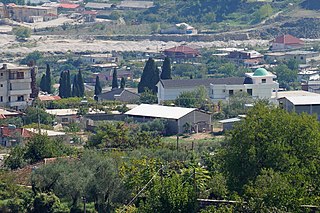
The Bektashi Order or Bektashism is an Islamic Sufi mystic order originating in the 13th-century Ottoman Empire. It is named after the saint Haji Bektash Veli. The Bektashian community is currently led by Baba Mondi, their eighth Bektashi Dedebaba and headquartered in Tirana, Albania. Collectively, adherents of Bektashism, are called Bektashians or simply Bektashis.

Rexheb Beqiri, better known by the religious name Baba Rexheb, was an Albanian Islamic scholar and Sufi. He was the founder and the head of the Bektashi Sufi lodge (tekke) located in Taylor, Michigan, United States.

Omer Nishani was an Albanian medical doctor and political figure involved first in the struggle against Ahmet Zogu in the 1920s and 1930s, and then in the struggle against the fascist occupation of Albania during the 1942–44 period, becoming Chairman of the Presidium of the People's Assembly of the People's Republic of Albania in 1946 and serving in this position until 1953.

The National Liberation Movement, also translated as National Liberation Front, was an Albanian communist resistance organization that fought in World War II. It was created on 16 September 1942, in a conference held in Pezë, a village near Tirana, and was led by Enver Hoxha. Apart from the figures which had the majority in the General Council it also included known nationalists like Myslim Peza. In May 1944, the Albanian National Liberation Front was transformed into the government of Albania and its leaders became government members, and in August 1945, it was replaced by the Democratic Front.

The Zall Tekke or Asim Baba Tekke is a Bektashi teqe in Gjirokastër, Albania. It is a Cultural Monument of Albania.

The Tekke of Frashër or Nasibî Tâhir Baba Tekke is a Bektashi shrine and Albanian Bektashi tekke founded in 1781 and registered Cultural Monument of Albania, located in Frashër, Gjirokastër County in southern Albania. The tekke was crucial to the Albanian National Awakening, particularly in the nationalist movements of the late 19th century, and it was one of the wealthiest and revered tekkes in Albania.

The Tekke of Dollmë or Haxhi Mustafa Baba Tekke is a Cultural Monument of Albania, located in Lagjja Kala, Krujë. Before its destruction by the Communist dictatorship, the tekke of Krujë had 360 holy graves and was known as "Little Khorasan".

Kasim Baba, also Kasem Baba, was a fifteenth century Bektashi religious figure and missionary. In Albania, he is venerated as a Muslim saint.

Islam in Communist Albania (1945–1991) covers a period of time when the Communist Party of Albania came to power under Enver Hoxha and exercised almost total control over the Albanian people. The communist government sought to radically overhaul Albanian society by realigning social, cultural and religious loyalties to the communist party through Albanian Nationalism in the pursuit of achieving unitary Albanian identity.

Ali Riza (1882–1944) was the 2nd Dedebaba of the Bektashi Order.

Xhafer Sadik (1874–1945) was the 4th Dedebaba of the Bektashi Order. He served as Dedebaba for only 3 months during the summer of 1945.
Abaz Hilmi was the 5th Dedebaba of the Bektashi Order.

Ahmet Myftar (1916–1980) was the 6th Dedebaba of the Bektashi Order. He was the final dedebaba to have served during the People's Socialist Republic of Albania.

The World Headquarters of the Bektashi or Bektashi World Center is the international headquarters of the Bektashi Order, a Sufi order. It is located on Dhimitër Kamarda Street at the eastern edge of Tirana city, Albania. It serves as the centre of the Albanian Bektashi Order.
The World Bektashi Congress, formerly called the National Congress of the Bektashi before the 1990s, is a conference during which leading members of the Bektashi Order make important decisions. It has been held in Albania since 1921.
Baba Ali Tomorri was an Albanian Bektashi religious leader.
The Bektashi Order is an Islamic Sufi order that spread to Albania through Albanian Janissaries during the period of Ottoman control in Albania. The Bektashi make up 20% of Albania's Muslim population and 2.5% of the country's population. In regards to ethics, the Bektashi adhere to the line "Be master of your hands, your tongue, and your loins" which essentially means do not steal, do not lie or speak idly, and do not commit adultery.
The Teqe of Bulqiza or Tekke of Bulqiza is a Bektashi tekke in the town of Bulqiza. It was founded in the nineteenth century by Baba Fejzë Bulqiza, an important Albanian Bektashi figure in the local Dibra region who opened schools in the surrounding area after returning to Albania in 1827 upon the completion of his religious training in Anatolia. The tekke was first destroyed in 1860, and Baba Fejzë Bulqiza is said to have been killed at this point in time as well, but he has no known grave. A new tekke was raised in his honour around 1900, and thereafter closed in 1967 during the Communist period due to the Albanian communist party's crackdown on religion. After the fall of the communist regime, the Teqe of Bulqiza was reopened as a tyrbe in 1994.

The Teqe of Baba Ali, or Teqe of Baba Abdullah, is a Bektashi tekke in the village of Alipostivan, Qendër Piskovë, Përmet municipality, Albania. It sits upon a hill overlooking the Vjosa valley and the Nemërçka mountain, and the name of Alipostivan itself is said to derive from Ali, post i vendit. The tekke of Baba Ali is known for the preservation and development of Bektashi traditions, particularly in spreading Bektashism to the Deshnica area and along the border villages of Skrapar. Historically, it has cooperated closely with the tekke in Frashër.
The Teqe of Baba Isuf or Teqe of Bllaca is a Bektashi tekke in the village of Bllacë, Dibër. It was founded in the late nineteenth century by Baba Isuf. The tekke has historically been an important centre of learning, known for its patriotic contributions in educating people in the Albanian language during late 19th and early 20th centuries. The tekke's feast day is the 10th of June.














